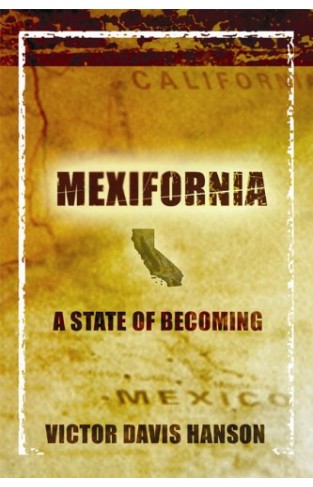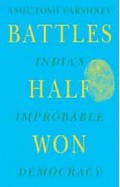Mexifornia - A State of Becoming
By: Victor Davis Hanson
-
Rs 990.00
Due to constant currency fluctuation, prices are subject to change with or without notice.
We're Offering A High Discount On This Book As It Is Slightly Damaged
Part history, part political analysis, and part memoir, Mexifornia is an intensely personal work by one of our most important writers. Victor Davis Hanson, known for his military histories and his social commentary, is a fifth-generation Californian who lives on a family farm in the Central Valley and has written eloquent elegies on the decline of agrarianism, Fields Without Dreams and The Land Was Everything. Here too, he ponders what has changed in California over the past quarter century, examining how the state and the Southwest more broadly―indeed, the entire nation―have been altered by hemorrhaging borders.
Hanson admires the ambition and vigor of immigrants who have helped make California strong, but he indicts the disordered immigration policies that led to the present mess. He also illuminates the ways those policies are harmful to people who have come from Mexico and Central America seeking a better life in the United States.
Nearly twenty years after the first publication of Mexifornia, Hanson offers an update on the continuing tragedy of illegal immigration. At the same time, he remains hopeful that our traditions of integration, assimilation, and intermarriage may yet remedy a predicament created by politicians and ideologues.
We're Offering A High Discount On This Book As It Is Slightly Damaged
Part history, part political analysis, and part memoir, Mexifornia is an intensely personal work by one of our most important writers. Victor Davis Hanson, known for his military histories and his social commentary, is a fifth-generation Californian who lives on a family farm in the Central Valley and has written eloquent elegies on the decline of agrarianism, Fields Without Dreams and The Land Was Everything. Here too, he ponders what has changed in California over the past quarter century, examining how the state and the Southwest more broadly―indeed, the entire nation―have been altered by hemorrhaging borders.
Hanson admires the ambition and vigor of immigrants who have helped make California strong, but he indicts the disordered immigration policies that led to the present mess. He also illuminates the ways those policies are harmful to people who have come from Mexico and Central America seeking a better life in the United States.
Nearly twenty years after the first publication of Mexifornia, Hanson offers an update on the continuing tragedy of illegal immigration. At the same time, he remains hopeful that our traditions of integration, assimilation, and intermarriage may yet remedy a predicament created by politicians and ideologues.
Zubin Mehta: A Musical Journey (An Authorized Biography)
By: VOID - Bakhtiar K. Dadabhoy
Rs 840.00 Rs 1,050.00 Ex Tax :Rs 840.00
In Europes Shadow Two Cold Wars and a ThirtyYear Journey Through Romania and Beyond
By: Robert D. Kaplan
Rs 895.50 Rs 995.00 Ex Tax :Rs 895.50
America Alone: The Neo-Conservatives and the Global Order
By: Stefan Halper
Rs 1,600.00 Ex Tax :Rs 1,600.00
The Origins of Political Order From Prehuman Times to the French RevolutioN
By: Francis Fukuyama
Rs 3,895.00 Ex Tax :Rs 3,895.00
Battles Half Won : Indias Improbable Democracy
By: Ashutosh Varshney
Rs 4,195.00 Ex Tax :Rs 4,195.00
Curzon's India: Networks of Colonial Governance, 1899-1905
By: Dhara Anjaria
Rs 796.00 Rs 995.00 Ex Tax :Rs 796.00
A Brief History of The Third Reich: The Rise and Fall of the Nazis - Paperback
By: Martyn Whittock
Rs 1,995.00 Ex Tax :Rs 1,995.00
US Policy in Afghanistan and Iraq
By: Seyom Brown & Robert H. Scales
Rs 2,236.00 Rs 2,795.00 Ex Tax :Rs 2,236.00
The Invisible Bridge: The Fall of Nixon and the Rise of Reagan
By: Rick Perlstein
Rs 2,150.00 Ex Tax :Rs 2,150.00
In Europes Shadow Two Cold Wars and a ThirtyYear Journey Through Romania and Beyond
By: Robert D. Kaplan
Rs 895.50 Rs 995.00 Ex Tax :Rs 895.50
America Alone: The Neo-Conservatives and the Global Order
By: Stefan Halper
Rs 1,600.00 Ex Tax :Rs 1,600.00
No recently viewed books available at the moment.
Zubin Mehta: A Musical Journey (An Authorized Biography)
By: VOID - Bakhtiar K. Dadabhoy
Rs 840.00 Rs 1,050.00 Ex Tax :Rs 840.00
In Europes Shadow Two Cold Wars and a ThirtyYear Journey Through Romania and Beyond
By: Robert D. Kaplan
Rs 895.50 Rs 995.00 Ex Tax :Rs 895.50
America Alone: The Neo-Conservatives and the Global Order
By: Stefan Halper
Rs 1,600.00 Ex Tax :Rs 1,600.00














-120x187.jpg?q6)








-120x187.jpg?q6)







